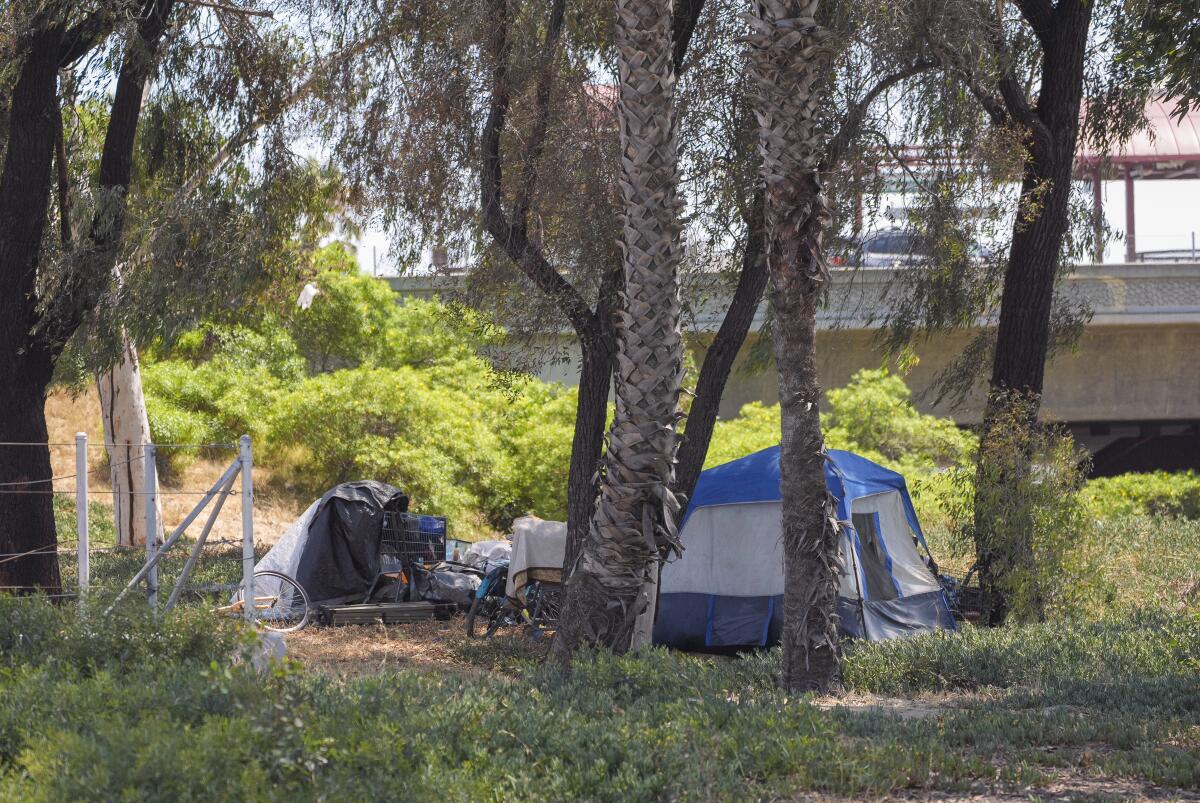I was homeless. Gov. Newsom’s order to dismantle encampments is outrageous

- Share via
It’s outrageous that the Supreme Court is allowing states and cities to criminalize homelessness and that Gov. Gavin Newsom is ordering encampments dismantled, especially when there’s not enough housing or shelter space for those who need it.
I was homeless for 6? years, from 2002 to 2008, a story I’ve told before in these pages. I know what it’s like when no one cares about you or your living situation.
I never pushed a shopping cart, never slept in a city park or on a sidewalk or in a tent encampment, never took drugs and never panhandled. I paid for all my food and for nightly stays in my Toyota pickup in state, city and federal parks, alongside tourists and recreational campers.
Ialways sort of dread Thanksgiving, and not just because I am alone or because no one invites me to dinner.
I worked the whole time I was homeless, mostly on computers in libraries, maintaining a freelance writing business and doing public relations consulting. I intermittently had cellphone service, and I had an email address, so most of my clients had no idea of my situation. But during an economic downturn, I couldn’t make enough money to rent a room or apartment.
Campgrounds have limits on how long you can stay, so I moved around a lot, mostly in Southern California, along the ocean and in the desert, sometimes in Montana, where I once lived.
I met a lot of people on the move and out of luck. At one campground’s entrance, a school bus picked up a homeless family’s child every morning. A guy I met collected cans on his bicycle and was able to pay for food; he never begged. Once he stashed his cans in a church parking lot; they were thrown out by staff, and he was told never to come back. A drug addict I knew died of exposure, curled up at the entrance to a store. One man I ran into on the campground circuit did OK for a while. Then I saw him panhandling. He’d had to sell his sleeping bag for food.
Eventually, I started getting Social Security and became eligible for Medicare, and my situation improved. I stayed in a cheap motel occasionally. I got needed cataract and knee surgery, recuperating in my pickup or a motel room.
The week before Christmas, after 6 1/2 years of homelessness, I moved into a city-owned senior housing apartment in Rancho Mirage, near Palm Springs.
When I had enough income to rent an apartment but not enough money for both rent and a deposit, a religious organization helped me out. I’d been on housing-assistance lists for years, waiting for a subsidized low-income apartment. Finally, I had a shower and a washing machine and a kitchen. I got my stuff out of storage. Finding my obsolete computer, TV, family photos and other mementos was like doing an archaeological dig on my former life.
I’m 80 now, and fortunate to have Social Security and Veterans Administration income, and I haven’t had to have housing assistance for years. Being homeless seems like a long time ago. But I never forget it.
When I see people panhandling, I don’t give them spare change, or even a dollar; I give them a five or a ten or a twenty — and a kind word. At Christmas, I keep $10 bills at the ready. I don’t care if someone is drunk or on drugs. I make no judgment. It helps them and it makes me feel good.
I don’t like to see tent encampments on sidewalks, or by the freeway, or in parks. But criminalizing homelessness, or clearing out tents isn’t an answer when there’s no place to go. We need more housing, more programs for mental illness and drug addiction, universal healthcare, maybe even a minimum basic income. And this: more facilities for the homeless to shower and go to the bathroom.
I know California has spent billions; it will cost more.
A rich nation like the United States should be capable of compassion. Feed the hungry, help the poor, heal the sick, house the homeless, clothe the naked, welcome strangers. Until the Supreme Court and Newsom find a better solution, they ought to start there.
Les Gapay, a former newspaper reporter, is retired and living in the Coachella Valley.
More to Read
A cure for the common opinion
Get thought-provoking perspectives with our weekly newsletter.
You may occasionally receive promotional content from the Los Angeles Times.









